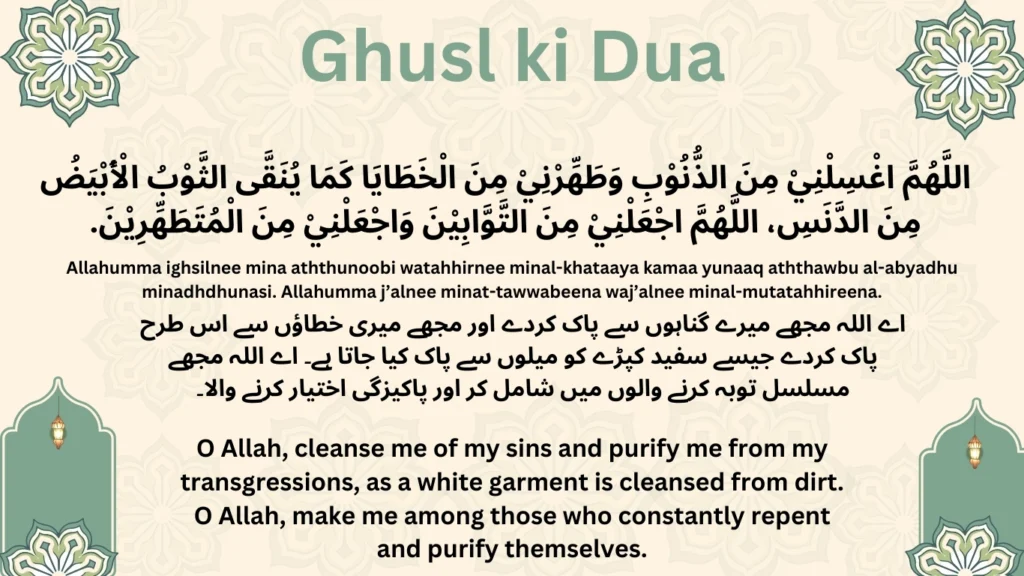In Islam, cleanliness is not just about physical hygiene; it is a vital part of spiritual practice. One of the most significant acts of purification is Ghusl, an obligatory full-body ritual washing. Integral to the practice of Ghusl is Ghusl Ki Dua, a supplication that elevates the act from mere physical cleansing to a spiritual exercise. For those seeking to understand the deeper meanings behind Ghusl and its associated prayers, this post will offer a comprehensive guide.
This article will explore the importance of Ghusl, the specific prayers (duas) involved, and the benefits both spiritual and practical that come with this time-honored tradition. Whether you are new to Islam, looking to deepen your faith, or simply seeking practical advice, this guide has something valuable for you.
Ghusl ki Dua

What is Ghusl? An Overview
Ghusl is a mandatory act of purification for Muslims, particularly after certain events like sexual activity, menstruation, and childbirth. It involves washing the entire body in a specific manner to attain ritual purity. Unlike the daily ablution (Wudu), Ghusl is a more comprehensive cleansing procedure.
Why Ghusl is Important
Ghusl serves multiple purposes. Firstly, it ensures physical cleanliness, which is crucial for overall health. Secondly, it fulfills religious obligations, making one fit to perform prayers (Salah) and other acts of worship. Finally, it has a spiritual dimension that connects the believer to Allah, reinforcing the idea that cleanliness is half of faith.
When Ghusl is Required
Specific instances necessitate Ghusl, including the following:
- Following the end of menstruation.
- After childbirth and postnatal bleeding.
- Before the Friday prayer (Jumu’ah) for men.
- Before the two Eid prayers.
Understanding these requirements helps in planning and maintaining regular spiritual hygiene.
How to Perform Ghusl
Performing Ghusl correctly is crucial for its acceptance. The process involves several steps aimed at ensuring complete cleanliness and spiritual readiness.
The Intent (Niyyah)
Begin Ghusl with the intention (Niyyah) of purification. The Niyyah is a silent affirmation in your heart that you are performing Ghusl to attain spiritual and physical cleanliness as prescribed in Islam.
Washing the Hands and Private Parts
Start by washing both hands up to the wrists and ensure that the private parts are thoroughly cleaned. This preliminary step is essential for removing any physical impurities.
Performing Wudu
Next, perform Wudu (ablution) as you would for Salah, except for washing the feet, which will be done later. Wudu includes washing the face, arms, and wiping the head.
Full Body Wash
Finally, pour water over the entire body, ensuring that every part is thoroughly wet. Begin with the right side, then the left, and finally pour water over the head and the entire body.
Conclusion
Ghusl Ki Dua is more than just words; it is a spiritual exercise that transforms the act of washing into a deeply meaningful practice. By understanding and incorporating Ghusl and its associated prayers into your routine, you not only fulfill a religious obligation but also enhance your physical and spiritual well-being.
For those new to the practice, start small and gradually incorporate these steps into your routine. And if you wish to explore more, consider consulting religious scholars or trusted sources for deeper insights. May your journey towards spiritual and physical purity be fulfilling and enlightening.

